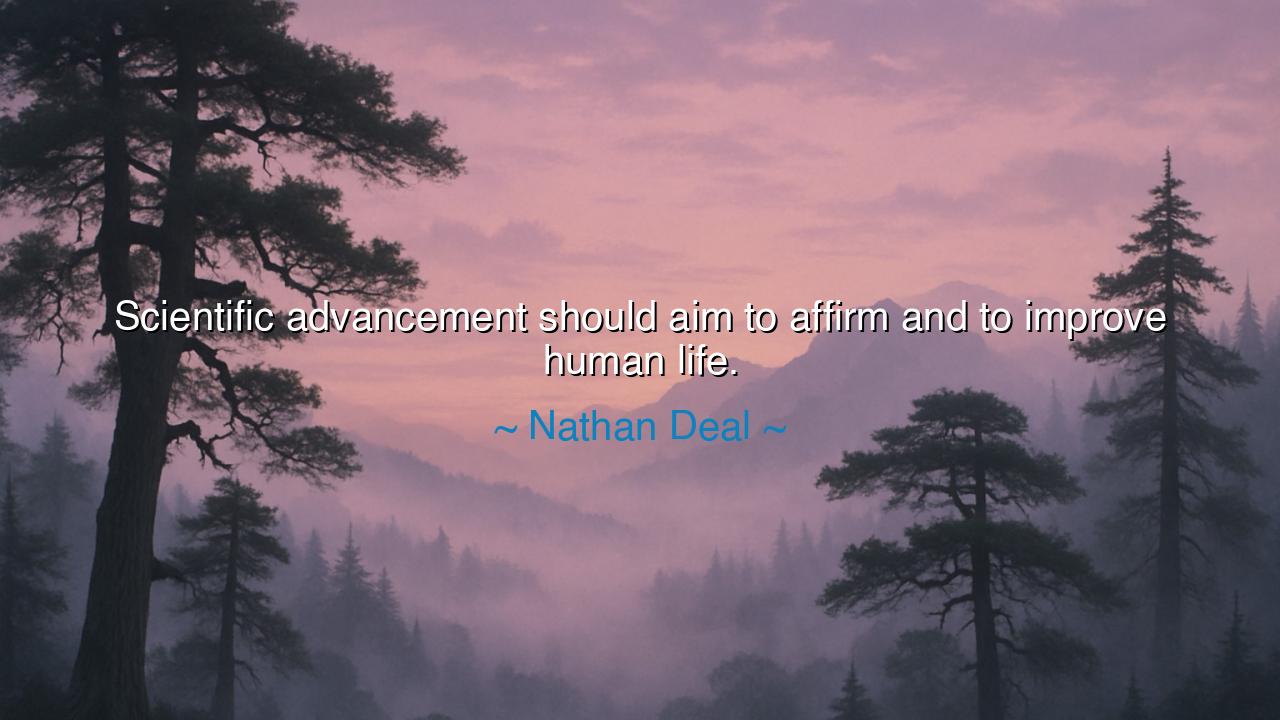
Scientific advancement should aim to affirm and to improve human






"Scientific advancement should aim to affirm and to improve human life." These words from Nathan Deal resonate like a guiding beacon, reminding us that science is not merely a tool for knowledge or curiosity, but a force that must serve humanity, that must enhance the very essence of our existence. Science is not an end in itself; it is a means to a higher goal, the affirmation and improvement of life, of our shared human experience. To separate science from this moral imperative is to lose sight of its true purpose—to shape a world that is better for all who walk upon it.
In ancient times, the great philosophers of old wrestled with the idea of knowledge. Plato, in his writings, often spoke of the power of wisdom and the dangers of using knowledge for selfish gain. He saw knowledge as a tool to help humanity understand the eternal truths and to guide our actions toward the good. This vision was not abstract. It was practical, rooted in the belief that knowledge and wisdom must serve the common good, that they must affirm and improve the lives of the people. Nathan Deal echoes this timeless wisdom in his call to see science not as something to be hoarded or pursued for mere intellectual gratification, but as a power that must elevate the human soul.
Consider the story of Louis Pasteur, the great French scientist whose discoveries in microbiology transformed the world. Before his work, people lived in fear of disease, unaware of the invisible forces that caused suffering and death. Pasteur’s scientific breakthroughs, particularly his work on the germ theory of disease and the development of vaccines, did not merely expand human knowledge—they improved lives, saved countless lives, and affirmed the sanctity of human health. His work in science gave humanity the tools to fight deadly diseases and live longer, healthier lives. In his case, science served its highest purpose: not the pursuit of abstract theory, but the betterment of mankind.
This connection between science and human life is not new. It has echoed throughout the ages. Consider the age of enlightenment, when thinkers such as Isaac Newton and Robert Hooke laid the foundations for modern physics and biology. Their work, while revolutionary, was driven by a desire to understand the natural world, not for its own sake, but to improve life. Newton’s laws of motion, for example, led to innovations that would ultimately shape the modern world. Yet, what is most profound about their work is that it was not simply about intellectual pursuit. These discoveries were meant to give humanity power, control, and the ability to shape its environment in ways that would affirm life.
And what of modern science, in all its dazzling complexity? The advancements in medicine, genetics, and technology have transformed human existence in ways once thought impossible. Consider the rise of gene therapy, a field that promises to eliminate genetic disorders and improve the health of future generations. Imagine the impact of the human genome project, which mapped our very DNA. These advancements do not simply enrich our understanding of biology; they are deeply rooted in the desire to improve the human condition, to remove suffering, to extend life, and to give all people a better, healthier world.
However, Nathan Deal’s call serves as a timely reminder. Science, while powerful, is a double-edged sword. It can be used to affirm life, to heal, to nourish, and to nurture, but it can also be used to destroy, to divide, and to harm. History shows us the dangers of knowledge misused. The development of nuclear weapons, for instance, demonstrates the darker side of scientific advancement—one where the pursuit of knowledge becomes detached from the moral imperative to improve human life. This is why Deal’s wisdom is so vital: we must remember that science is not a neutral force; it is a force that must be guided by ethical principles.
The lesson here is clear: as we push the boundaries of scientific advancement, let us remember its higher purpose: to affirm and improve human life. Every new discovery, every new innovation, must be weighed not just in terms of its technical prowess, but in terms of its impact on humanity. Will it heal? Will it bring hope? Will it make life better for all? We must use the gifts of science as a beacon of light, guiding us toward a future where the sacredness of human life is at the center of our efforts.
In our own lives, let us embrace the call to use our knowledge, our talents, and our skills not for personal gain or glory, but for the betterment of all. Seek knowledge with a heart full of purpose and a mind attuned to the needs of others. In every action you take, ask yourself: how can this contribute to a world that affirms the value of every human life? In this way, we will honor the true spirit of scientific advancement, and through it, create a world worthy of the dreams of those who came before us.






AAdministratorAdministrator
Welcome, honored guests. Please leave a comment, we will respond soon